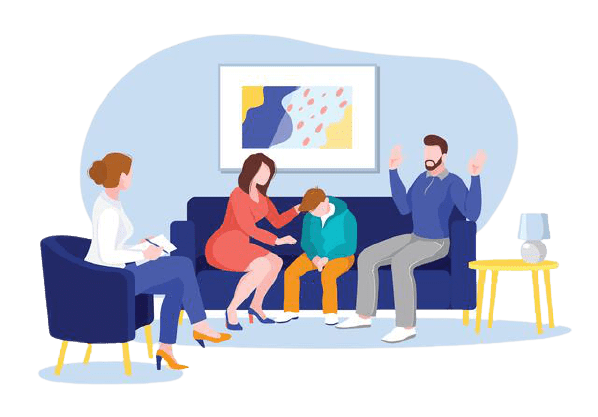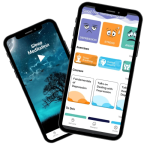Online Teen Counseling| Best therapist for Teen Help
- Set up a free & confidential chat on your depression issues
- Unlimited help through depression self-care app
- Live Video or Chat sessions with top depression therapists
Begin Therapy
Consult online with best Therapist
Get the Best Help for Teen
TherapyMantra is here to help you on your path to recovery from teen issues. We match you with the best teen therapists available 24/7 via video call or messages.
Match with Teen Issues Therapists
We assign the best counselors experienced in teen issues based on your needs.
Affordable and Effective
Our online sessions are 90% less expensive than in-person therapy, available 24/7.
Self-Care for Teens
We offer ongoing teen support through self-care tools, teen help videos, chat groups, meditations, breathing exercises, and other resources.

How it works?
You are matched with a teen counselor based on your needs and preferences. You get a secure “therapy room” where you can communicate with your counselor via chat or phone. You can write or talk about teen issues & ask questions to deal with teen issues.

Register for Teen Counseling
Simply complete a 5-minute online form to tell us about your teen issues

Consult with your Teen Therapist
We connect you with teen counselors who are available 24/7 based on your preferences and needs.

Connect to Our App
Apart from Video/chat sessions, our app offers self-care tools, videos, and meditations to help you deal with your Teen Issues.
Best Teen Issues Therapists
Positive conversations, exercises, and meditations are used by TherapyMantra psychologists to help you deal with teen issues. Our teen issues therapists outperform traditional counseling as you get matched from a pool of 500+ teen counselors, who offer 24/7 unrestricted private chat.








What Are Teen Issues?
Teen Issues is a term that refers to the many challenges that teenagers face. TThese causes are maybe internal or external. This issue may describe as depression, eating disorders, social isolation, or alienation. You can know the external problem when you can see the events or experiences in their life. There can be many signals that a teen is suffering. One of them is hurting themselves in some way, such as cutting or burning their skin. They may also feel hopeless and have suicidal thoughts or attempt suicide.
Common Causes of these issues can be events in their life, such as the loss of someone close to them or watching a parent struggle with addiction. Some other issues can be physical, such as a brain injury or struggling with sexual identity.
Different Teen Issues
Internal problems are hidden and harder to identify. There are different teen issues that one can be aware of. The external problem is easier to see because it is happening in their life.
Some common teen issues include:
Anxiety
Children may be suffering from anxiety and they might not even know it. Signs that a child is anxious can include: headaches, stomach aches, feeling tense or jumpy, avoiding social situations, constantly worrying, problems sleeping, and more. If left untreated, anxiety can lead to depression and other mental health issues.
Bullying
Bullying can have serious consequences for the victims of bullying. It can cause physical injuries, social isolation, depressed moods, decreased academic achievement, and more. Bullies often have problems such as anger management issues and low self-esteem.
Eating Disorders
An eating disorder is a serious mental illness that causes people to have an unhealthy attitude towards food and their body size. There are three main types of eating disorders: anorexia nervosa, bulimia nervosa, and binge eating disorder. All of these disorders can be deadly if left untreated.
Depression
Depression is a serious mental illness that causes people to feel sad, hopeless, and unmotivated for weeks or months at a time. It can lead to suicide if left untreated. Depression is very common in teenagers and early adults.
Sexual Orientation/Gender Identity
Teens who are struggling with their sexual orientation or gender identity may feel alone and scared. They may not know where to turn for help or how to talk about their feelings. They may feel like they can’t be open about their sexuality or gender with friends and family. They may feel like they are different from everyone else, causing them to have low self-esteem.
Suicidal Thoughts/Attempts
A teen who is thinking of suicide might talk about it directly, write songs or poems about hopelessness and despair, give away prized possessions (with the exception of important things like identification), make comments that suggest they would be better off dead—such as “What’s the point? It won’t matter in a few months anyway!” Some teens may even threaten to hurt themselves if something specific happens (ex: If I don’t get my way on this issue). Others may attempt suicide through substance abuse, reckless driving, or cutting.
Alcohol or Drug Abuse
Alcohol and drugs can be very dangerous for teenagers. They are not equipped with the decision-making skills or brain development that allow adults to handle such substances responsibly. Teens may abuse alcohol, tobacco, marijuana/cannabis, prescription medications (opioids), synthetic cannabinoids (Spice/K-Two), inhalants (glue sniffing) cocaine, and other stimulant drugs or a combination of these substances! Teenagers who begin drinking at an early age—even as young as 12 years old—are more likely to develop problems with addiction later on in life.
Treatment For Teen Issues
There are many different ways that a counselor can help teens with their issues. Some of these options are:
Medications
These medications are prescribed by the counselor and can help with symptoms of mental health issues. Medications should only be used under the supervision of mental health professionals.
Education/Prevention
Counselors can also educate teenagers about the risks and dangers of certain substances. They can also help teenagers find ways to prevent mental health issues in the future through good social skills, coping mechanisms for stress, and more!
Counseling
Counseling is often done with a counselor or therapist. Therapy can be helpful for both the teenager and their parents/guardians to talk about issues that may not come up in everyday conversation, such as feelings of guilt, shame, anxiety, sadness, etc.
Support Groups
Some counselors will also organize or encourage their clients to start support groups. These are a great way for teens to have fun with peers who share similar experiences and feelings.
Skills-Building Activities
Some counseling sessions are spent teaching teenagers new skills (ex: mindfulness meditation) so they can handle difficult situations better on their own. Counselors will also encourage teens to practice these skills at home between sessions! Some activities include writing letters to someone you’re mad at; practicing deep breathing; playing active games; drawing pictures of your emotions; doing art projects like clay sculptures or collages—anything that helps express how you feel!
How Teen Counseling Can Help?
Teen counseling can be extremely beneficial in helping teenagers deal with the many challenges and stresses of growing up. Teen counselors can help teens learn how to cope with their feelings, solve problems, and make healthy decisions. Teen counseling can also help improve relationships with family and friends and boost self-confidence. This type of counseling not only benefits the teenager but also their family and friends.
There are many ways that teen counseling can help teenagers overcome these challenges and lead happier lives. Through therapy, teens learn how to effectively express themselves so they feel more comfortable sharing what’s on their minds. They also gain tools for coping with difficult emotions like anger, stress, sadness, disappointment—and frustration! Therapy is all about learning self-awareness and mindfulness which then leads to increased control over destructive behaviors. Teens also become better decision-makers who are equipped with strategies for dealing with future problems without turning to harmful substances or activities (such as drugs/alcohol). As you can see, counseling is a powerful intervention that can have long-lasting benefits for individuals and their loved ones.
Therapy Options For Teen Issues
There are many different types of therapy that can be useful for teenagers. Some common therapies include:
Cognitive Behavioral Therapy (CBT)
This type of therapy focuses on helping people identify and change negative thoughts and behaviors. CBT is often effective in treating conditions like depression, anxiety, and addiction.
Dialectical Behavior Therapy (DBT)
DBT helps people learn how to manage difficult emotions effectively. It can be helpful for individuals with Borderline Personality Disorder, eating disorders, self-harm behaviors, and substance abuse issues.
Family Systems Therapy
This type of therapy examines the family as a unit and looks at how each member’s behavior affects the whole system. Family systems can be beneficial for teenagers who are experiencing difficulties at home.
Interpersonal Therapy (IPT)
IPT focuses on solving current interpersonal problems and improving communication skills with others. This type of therapy can be helpful for individuals who struggle to communicate effectively or maintain relationships. It’s also beneficial in treating conditions like depression, anxiety, grief/loss issues, eating disorders, relationship conflicts—and addiction.
How To Find a Teen Therapist?
TherapyMantra can help you find a teen therapist near you. We have over 500+ therapists listed on our therapist directory. You can follow the following steps to find a good teen therapist:
- First, ask your family doctor or anyone else you are seeing for a referral for a teen therapist.
- The next thing you’ll want to do is ask your friends and loved ones for referrals.
- The next thing you’ll want to do is look online. There are many websites that help people find therapists in their area who can treat things like teen issues.
10,000+ Happy & Healed Teens

“My child was always a distant child. I never knew what was the reason for it. Then TherapyMantra came into his life. It not only helped him to gain confidence but also helped him gain self-importance. It helped my child in his new journey.
”
Kevin,
1 year on TherapyMantra
FAQs
There are many factors that can cause problems for teenagers. A major issue is peer pressure which leads to the use of drugs, alcohol, and other harmful substances. Children may also experience difficulties at home or school with family members or teachers. Other common issues include bullying/social rejection, academic struggles, low self-esteem—and feelings of depression and anxiety
Some signs teens might be suffering from teen issues include: acting differently than normal; withdrawing from friends or activities they once enjoyed; talking about suicide or death often; deteriorating grades in school; missed classes without a valid reason (ex: doctor’s appointments); sudden loss of interest in favorite hobbies/activities.
If you suspect your teen is struggling with issues, it’s important to bring up the subject in a non-confrontational manner. Communicate that you care about them and want to help if they are having problems. You can then offer guidance or refer them to professional counseling services for more information/assistance.
If your teen is experiencing any of the following, they may benefit from counseling:
- Problems in school or with grades
- Drug and alcohol abuse
- Eating disorders
- Depression or anxiety
- Self-harm behaviors (cutting, burning)
- Suicidal thoughts or attempts
- Trouble sleeping or nightmares
Yes! The conversations that take place during therapy are confidential. No information will be shared without your permission.
If your teen resists going to counseling, it’s important to remain supportive and understanding. You can explain why you think therapy would be beneficial and offer to go with them to the first session. If your teen still doesn’t want to go, you can try seeking counseling for yourself or finding a therapist who will work with adolescents without their parents present.


